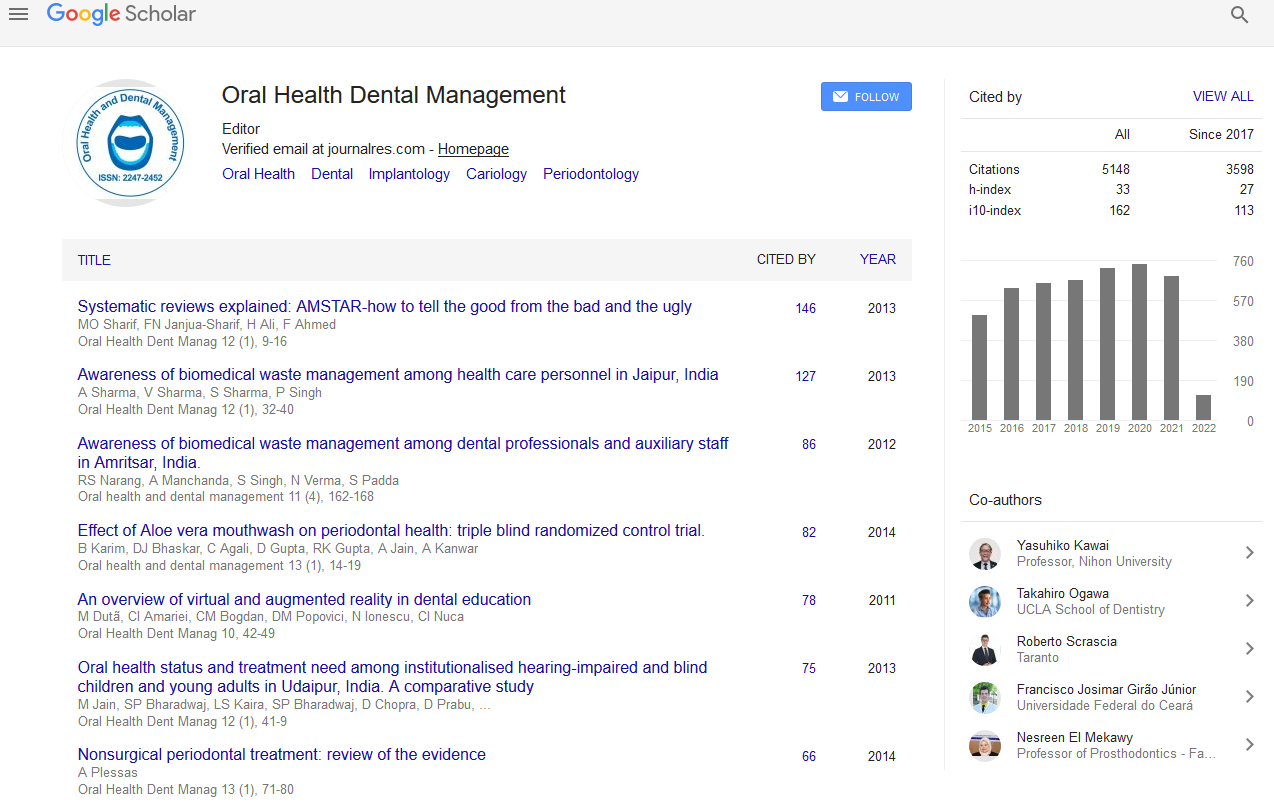Indexed In
- The Global Impact Factor (GIF)
- CiteFactor
- Electronic Journals Library
- RefSeek
- Hamdard University
- EBSCO A-Z
- Virtual Library of Biology (vifabio)
- International committee of medical journals editors (ICMJE)
- Google Scholar
Useful Links
Share This Page
Journal Flyer

Open Access Journals
- Agri and Aquaculture
- Biochemistry
- Bioinformatics & Systems Biology
- Business & Management
- Chemistry
- Clinical Sciences
- Engineering
- Food & Nutrition
- General Science
- Genetics & Molecular Biology
- Immunology & Microbiology
- Medical Sciences
- Neuroscience & Psychology
- Nursing & Health Care
- Pharmaceutical Sciences
Combinatorial effects of arginine and fluoride on oral microbial ecology
4th Asia Pacific Congress & Expo on Dental and Oral Health
July 27-29, 2015 Brisbane, Australia
Xin Xu, Xin Zheng and Xuedong Zhou
Posters-Accepted Abstracts: Oral Health Dent Manag
Abstract:
Fluoride is a widely used anti-caries agent, which promotes tooth hard tissue remineralization and suppresses bacterial activities. Recent clinical data have shown that oral hygiene products containing both fluoride and arginine possess superior anti-caries effect compared to those containing fluoride alone, indicating synergy between fluoride and arginine in promoting caries-preventive benefit. Here we hypothesize that arginine may augment the ecological benefit of fluoride by enriching alkaligenerating bacteria in the plaque biofilm, and thus synergizes with fluoride in controlling dental caries. Specifically, we assessed the combinatory effects of NaF/arginine on the microbial composition of single-, dual- and three-species biofilm using bacterial species-specific fluorescence in situ hybridization and quantitative PCR. We also recruited 30 volunteers with either cariesfree (CF; n=15, DMFT=0) or caries-active (CA; n=15, DMFT>4) status to further evaluate the ecological benefit of toothpaste containing both fluoride and arginine. We found that arginine synergized with fluoride in suppressing acidogenic S. mutans in either planktonic or biofilm cultures. The NaF/arginine combination synergistically reduced S. mutans but enriched S. sanguinis, and thus maintained a ?streptococcal pressure? against the potential growth of P. gingivalis within the three-species biofilm in vitro. More importantly, this S. sanguinis-enriching effect was reproduced in vivo after two-week application of arginine-containing fluoride toothpaste in CA group. The arginine-containing fluoride toothpaste also significantly inhibited the acidogenic capacity and promoted the alkali-generating activity of cariogenic microflora. The ?metabolism-normalizing? effects of arginine-containing fluoride toothpaste are likely attributed to its ability to enrich the transcripts of arcA and ureC, and suppress ldh transcripts of oral microbiome in CA population. Taken together, we conclude that the combinatory application of fluoride and arginine is able to maintain a healthy oral microbial equilibrium, and thus represents a promising ecological approach to caries management.

